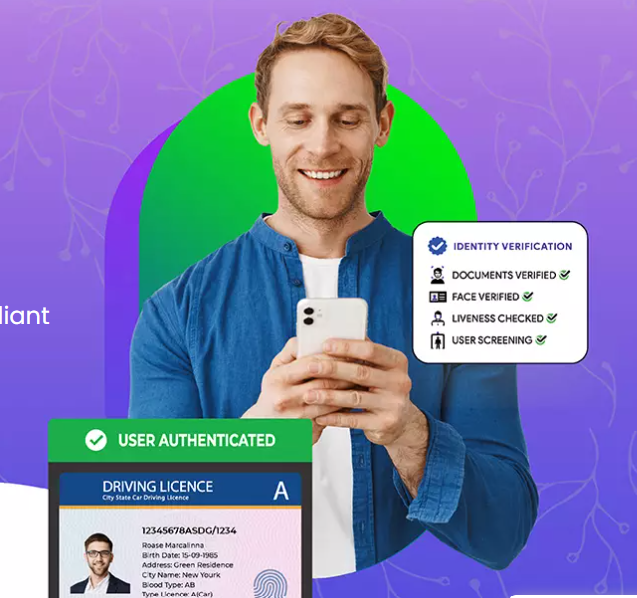In today’s fast-paced digital era, businesses are constantly evolving to meet security challenges. Identity fraud, data breaches, and unauthorized access are on the rise, making it critical for organizations to adopt stringent verification processes. Among the many innovations in identity verification, voice verification and KYC verification service stand out as reliable methods for enhancing security and safeguarding personal information.
In this blog, we will explore how voice verification and KYC verification services are revolutionizing the way businesses handle digital security and customer onboarding.
What is Voice Verification?
Voice verification, or voice biometrics, is an authentication method that uses unique voice patterns to verify a person’s identity. The human voice, like fingerprints or facial features, contains distinctive characteristics such as pitch, tone, and rhythm that can be analyzed for authentication purposes.
Key Features of Voice Verification:
- Accuracy: Voice verification is highly accurate as it analyzes over 100 vocal features, ensuring that each individual’s voice print is unique.
- Convenience: This technology allows for seamless authentication, as users can be verified in real-time during a phone call or online interaction.
- Security: Since voiceprints are almost impossible to duplicate, the risk of identity theft is significantly reduced.
Voice verification is gaining traction across various sectors, from banking and healthcare to telecommunications. It provides a layer of security while enhancing user experience by eliminating the need for passwords or security questions.
Understanding KYC Verification Services
KYC (Know Your Customer) is a critical process used by organizations, particularly financial institutions, to verify the identity of their customers. KYC verification services ensure that the individuals or businesses they are dealing with are legitimate, which helps prevent money laundering, terrorism financing, and other illegal activities.
Key Components of KYC Verification:
- Document Verification: Customers provide government-issued documents such as passports, driver’s licenses, or national ID cards, which are cross-checked for authenticity.
- Biometric Verification: Some KYC verification processes now incorporate biometric data like fingerprints, face recognition, or voice verification, adding an additional layer of security.
- Address Verification: KYC services confirm the physical address of the individual or business through utility bills, rental agreements, or other official documents.
- Ongoing Monitoring: KYC isn’t a one-time process. Organizations continuously monitor customer activities to detect suspicious transactions or behavior.
With stringent KYC processes in place, businesses can ensure compliance with legal requirements while minimizing the risk of fraud.
How Voice Verification Enhances KYC
Combining voice verification with traditional KYC methods creates a powerful security solution. Here’s how voice biometrics complement the KYC process:
- Faster Onboarding: Voice verification accelerates the KYC process by allowing users to verify their identity in seconds, without the need for lengthy documentation checks.
- Enhanced Security: Adding voice verification to KYC processes ensures an extra layer of protection against identity fraud and impersonation attempts.
- Cost-Effective: By automating identity verification through voice biometrics, companies can reduce the cost of manual document reviews and improve operational efficiency.
- Better Customer Experience: Customers can experience frictionless onboarding and interactions, as voice verification eliminates the need to remember passwords or security codes.
Industries Benefiting from Voice Verification and KYC Services
1. Banking and Financial Services
The financial sector is a prime target for cybercriminals. With voice verification, banks can enhance customer security during transactions and prevent unauthorized access to accounts. Integrating voice verification with KYC services ensures that only legitimate users are granted access to sensitive financial information.
2. Telecommunications
Telecom companies face the challenge of verifying the identity of millions of users daily. Voice verification streamlines the customer authentication process while reducing the risk of SIM card fraud and identity theft. Coupled with KYC, telecom providers can ensure compliance with regulatory requirements.
3. Healthcare
In healthcare, patient privacy is paramount. Voice verification allows patients to authenticate themselves easily over the phone or online, ensuring that sensitive medical information remains secure. KYC processes can be applied to verify the identity of new patients or healthcare providers.
4. E-Commerce
E-commerce platforms are often targeted by fraudsters using stolen identities. By adopting voice verification and KYC verification services, these platforms can create a safer environment for customers, ensuring that purchases and financial transactions are carried out by verified individuals.
The Future of Voice and KYC Verification
The future of digital security lies in the continuous development of technologies like voice verification and KYC services. As artificial intelligence and machine learning algorithms become more sophisticated, the accuracy and reliability of these verification methods will only improve.
Companies that invest in voice biometrics and KYC verification services today are positioning themselves to not only combat fraud but also offer a superior customer experience. In the coming years, we can expect wider adoption of these technologies across various industries, setting new standards for secure and convenient identity verification.
Conclusion
As the digital landscape continues to evolve, businesses must prioritize secure and efficient identity verification methods. Voice verification and KYC verification services offer a robust solution to today’s security challenges, enabling companies to authenticate users with accuracy and speed.
By integrating these technologies, organizations can protect themselves from fraud, ensure regulatory compliance, and deliver a seamless user experience. Whether in banking, healthcare, telecommunications, or e-commerce, the combination of voice biometrics and KYC verification is transforming the way we approach digital security.


